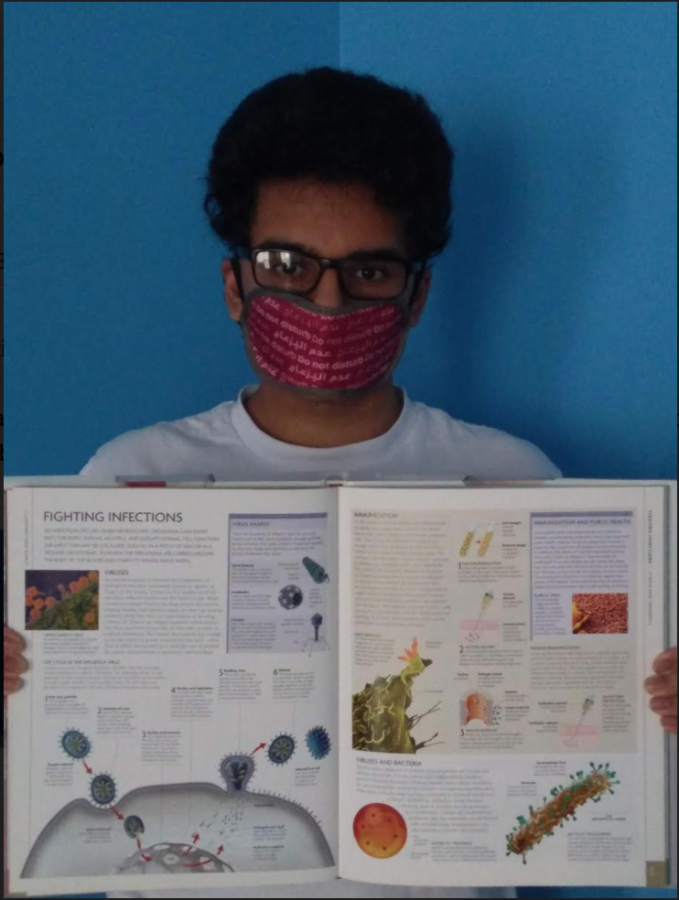Coronavirus Diaries: Vikram Bala
During quarantine, I’ve been doing some side reading about fighting infections. I’m wearing a sleep mask over my nose and mouth because we weren’t able to buy actual masks. Please excuse my quarantine hair.
May 11, 2020
Coronavirus Diaries is a series of diary-type entries written by students and staff documenting the day to day activities and experiences in quarantine. If you are interested in submitting an entry, contact us at [email protected]
Citizens wearing masks, overloaded hospitals and businesses ruined. A microscopic
virus. An immeasurable impact. And no cure. 500 million people infected. 50 million deaths. And
many more lives changed forever. Does this sound familiar to you?
If the thought of the COVID-19 crisis immediately came to your mind, I don’t blame you.
But you’re actually quite wrong (it’s okay, we all make mistakes). In fact, you weren’t alive when
this happened. Yes, we are currently living through one of the biggest global crises in recent
history. But the event I described above is not this- it was worse. This was the Spanish flu
pandemic of 1918, and my oh my, was it something exquisitely extraordinary.
During the pandemic, one-third of the world’s population at the time was infected. To put
that in perspective, one or two of your family members most likely had the disease. For
comparison, at time of print, the coronavirus has infected around 4.15 million people, which will
increase due to lack of adherence to social distancing guidelines; this is around 0.05%, or
one in every 2000 people, of the world’s population. So that’s like one or two students in our entire school. That’s minuscule when compared to the Spanish flu pandemic. From America to Europe to Asia and beyond, the Spanish flu virus created a path of destruction and death. 50 million people ended up dying- much more than the 16 million that died from the preceding World War I. But at this point, you’re probably wondering how any of this matters. I’ll show you. Why did it get so bad back then? The answer is simple: nobody knew what it was.
Soldiers traveling around the world after the war spread the disease around the world. No
country was equipped with the proper resources, and nobody knew how to treat it anyway. It
was thought that aspirin could cure the disease. In fact, some people ingested such large
amounts of aspirin (kids, don’t try this at home) that they died from aspirin poisoning. The lack of
understanding about the disease and failure to implement social distancing procedures led to its
rampant spread across the globe.
100 years later, much of that has changed. We have made significant advancements in
the medical field. Though we don’t have a cure for the virus yet, we have a much deeper
understanding of how to slow its spread. We also have an extensive set of resources to combat
- And together, we have the resolve. To all the people out there who are working tirelessly to
fight the disease and maintain a sense of normalcy in our world: we salute you. But at the end of the day the conclusion of this pandemic is going to depend on the people.
“Fool me once, shame on you. Fool me twice, shame on me.” Now, this should sound familiar to you. I’m sure you’ve been told a million times to stay at home and remain socially distant. And this is why: we don’t want a repeat of the Spanish flu pandemic; we must learn from our mistakes. And we now have the knowledge and resources to do so. We can shame the Spanish flu as much as we want- it fooled us once. But we can’t make the same mistake again- or it’s a shame on us. If we continue on as if nothing happened, where’s the learning in that? It’s about as effective as FCPS distance learning. So the sooner we adapt to this new setting, the sooner we can return to the old one.
So you’re stuck at home. What should you do? I’m not going to tell you to not waste
your time, because that would be hypocritical. But I will say this: seize this opportunity, try
something different and spend time with your family.
In fact, I’m writing this piece for fun. I usually don’t write for fun, as you can probably
tell from the quality of this writing, but it’s something I personally decided to experiment with.
By now, you’re probably getting tired of reading this, as quarantine thoughts can quickly
lead our minds away from the task at hand. So I’ll leave you with this final message: we don’t
know how long this will last, but in the meantime, stay calm, stay safe, stay socially distant, stay
productive (or at least try to) and most importantly, stay positive (but not for corona).


